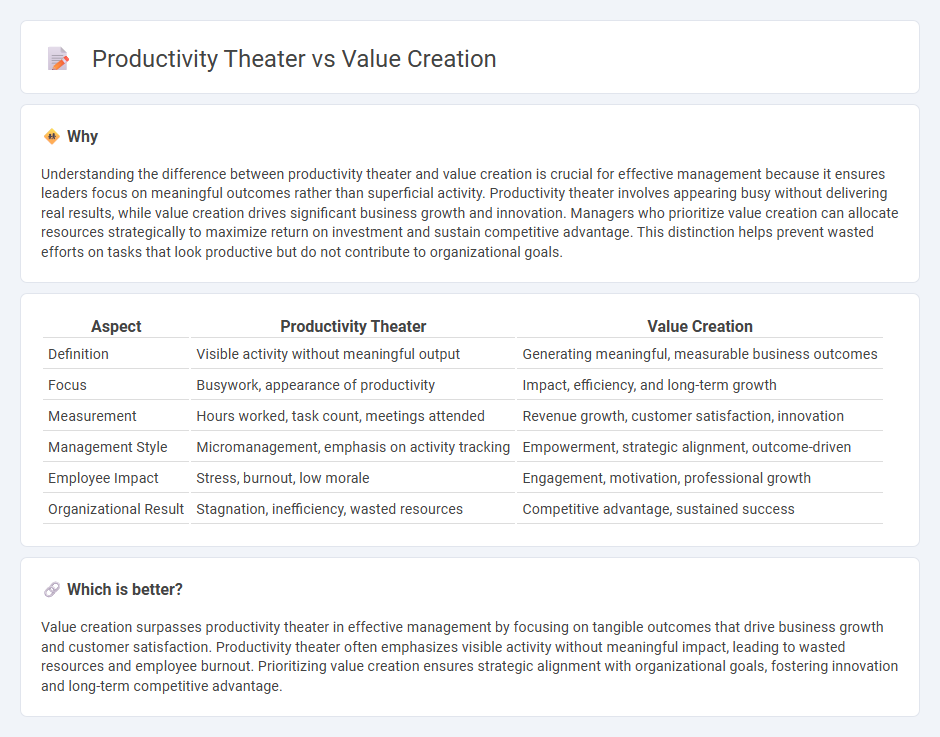
Management challenges often arise from productivity theater, where efforts focus on appearing busy rather than generating meaningful outcomes, leading to wasted resources and diminished employee morale. True value creation emphasizes strategic initiatives that drive measurable business results, foster innovation, and enhance customer satisfaction. Explore proven strategies to shift from productivity theater to impactful value creation for sustainable organizational success.
Why it is important
Understanding the difference between productivity theater and value creation is crucial for effective management because it ensures leaders focus on meaningful outcomes rather than superficial activity. Productivity theater involves appearing busy without delivering real results, while value creation drives significant business growth and innovation. Managers who prioritize value creation can allocate resources strategically to maximize return on investment and sustain competitive advantage. This distinction helps prevent wasted efforts on tasks that look productive but do not contribute to organizational goals.
Comparison Table
| Aspect | Productivity Theater | Value Creation |
|---|---|---|
| Definition | Visible activity without meaningful output | Generating meaningful, measurable business outcomes |
| Focus | Busywork, appearance of productivity | Impact, efficiency, and long-term growth |
| Measurement | Hours worked, task count, meetings attended | Revenue growth, customer satisfaction, innovation |
| Management Style | Micromanagement, emphasis on activity tracking | Empowerment, strategic alignment, outcome-driven |
| Employee Impact | Stress, burnout, low morale | Engagement, motivation, professional growth |
| Organizational Result | Stagnation, inefficiency, wasted resources | Competitive advantage, sustained success |
Which is better?
Value creation surpasses productivity theater in effective management by focusing on tangible outcomes that drive business growth and customer satisfaction. Productivity theater often emphasizes visible activity without meaningful impact, leading to wasted resources and employee burnout. Prioritizing value creation ensures strategic alignment with organizational goals, fostering innovation and long-term competitive advantage.
Connection
Productivity theater occurs when organizations focus on the appearance of busyness rather than actual output, undermining genuine value creation. Effective management prioritizes measurable results and strategic initiatives that drive innovation, efficiency, and customer satisfaction, fostering sustainable growth. Aligning team efforts with clear goals transforms productivity into tangible business value, avoiding the pitfalls of superficial activity.
Key Terms
Innovation
Driving true value creation requires prioritizing innovation that delivers measurable business outcomes over mere productivity theater, which often inflates outputs without real impact. Companies that align innovation strategies with customer needs and market trends generate sustainable competitive advantages and increased ROI. Explore how to shift from productivity illusions to authentic value creation through strategic innovation.
Operational Efficiency
Operational efficiency drives value creation by streamlining processes and maximizing resource utilization, directly impacting profitability and competitive advantage. Organizations prioritizing measurable improvements in workflow, cost reduction, and quality enhancement avoid falling into productivity theater, which emphasizes superficial metrics without tangible outcomes. Explore effective strategies to enhance operational efficiency and sustain long-term value creation.
Stakeholder Impact
Value creation emphasizes measurable improvements in stakeholder outcomes, such as increased customer satisfaction, shareholder returns, and employee engagement, while productivity theater often showcases superficial metrics without meaningful impact. Genuine value creation aligns business strategies with long-term stakeholder interests, ensuring sustainable growth and competitive advantage. Explore more on how organizations can shift from productivity theater to true value creation for holistic stakeholder success.
Source and External Links
The Art of Value Creation: Driving Success Through Innovation - Value creation in business means offering products or services that meet and exceed customer expectations, thereby inspiring loyalty, increasing profits, and generating sustainable benefits for customers, stakeholders, and the company itself through a reinforcing cycle of investments and innovation.
Value Creation Definition, Model and Examples in Business - Value creation involves turning resources into valuable offerings that deliver superior customer value, which leads to competitive advantage, customer retention, higher pricing power, innovation leadership, and barriers to entry against competitors in the market.
Value Creation in Business | Definition, Importance & Examples - Value creation is the process by which businesses transform inputs (tangible or intangible) into products or services that customers perceive as solving their problems, leading to increased profits, market control, and unique brand differentiation beyond mere cost inputs.
 dowidth.com
dowidth.com